Make A Donation
Click Here >
Posts Categorized: Mining
December 5, 2017
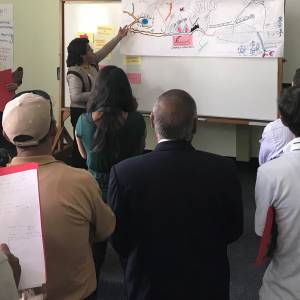 New platform of communities fighting for their rights to health present their demands to Minister of Health By Jed Koball | Mission Co-Worker, Joining Hands Peru Leaders representing eight different communities whose health is affected by mining and oil industry activity gathered for the first time this past week in Lima. Dating back as much as… Read more »
New platform of communities fighting for their rights to health present their demands to Minister of Health By Jed Koball | Mission Co-Worker, Joining Hands Peru Leaders representing eight different communities whose health is affected by mining and oil industry activity gathered for the first time this past week in Lima. Dating back as much as… Read more »
June 15, 2017
 By Jed Koball | Mission Co-worker Peru A report earlier this week from the nationally distributed paper La Republica, claims that The Renco Group, Inc. has once again filed an investment dispute arbitration against the State of Peru in the World Bank’s arbitration forum the Investment Center for the Settlement of Investment Disputes (ICSID). To… Read more »
By Jed Koball | Mission Co-worker Peru A report earlier this week from the nationally distributed paper La Republica, claims that The Renco Group, Inc. has once again filed an investment dispute arbitration against the State of Peru in the World Bank’s arbitration forum the Investment Center for the Settlement of Investment Disputes (ICSID). To… Read more »
April 10, 2017
By Jed Koball In a desperate move to facilitate the sale of the Metallurgical Complex in La Oroya, Peru the Ministry of Environment (MAM) approved a significant relaxation of national sulfur-dioxide emissions by increasing the threshold from 20mg/m3 (levels recommended by the World Health Organization) to 250mg/m3 (the current standards in neighboring countries like Chile… Read more »
March 15, 2017
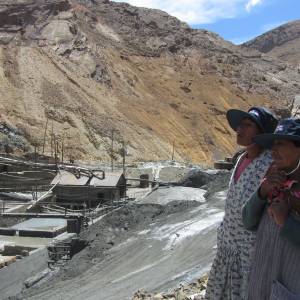 By Chenoa Stock | Mission Co-worker, UMAVIDA, Joining Hands Bolivia The Bolivian Joining Hands Network, UMAVIDA (Joining Hands for Life), focuses their campaign for water rights and environmental justice in the city of Oruro, a principal center for mining, Bolivia’s second largest industry. Located just outside of Oruro, the small town of Huanuni is… Read more »
By Chenoa Stock | Mission Co-worker, UMAVIDA, Joining Hands Bolivia The Bolivian Joining Hands Network, UMAVIDA (Joining Hands for Life), focuses their campaign for water rights and environmental justice in the city of Oruro, a principal center for mining, Bolivia’s second largest industry. Located just outside of Oruro, the small town of Huanuni is… Read more »
December 9, 2016
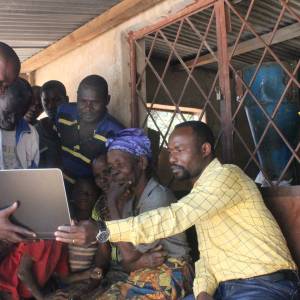 By Ibond Rupas A’nzam | Coordinator of POM, Joining Hands Congo The mining sector is so far the main driver of economic growth in Democratic Republic of Congo (DRC). The mining code and mining regulations issued in 2002 and 2003 respectively attracted a large number of private investors, particularly in the Copperbelt region of Katanga… Read more »
By Ibond Rupas A’nzam | Coordinator of POM, Joining Hands Congo The mining sector is so far the main driver of economic growth in Democratic Republic of Congo (DRC). The mining code and mining regulations issued in 2002 and 2003 respectively attracted a large number of private investors, particularly in the Copperbelt region of Katanga… Read more »
December 2, 2016
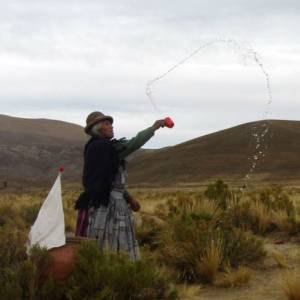 By Alejandrina Ibañez Aramayo | UMAVIDA Twenty years ago, the Peñas Canyon, located in the Pazña Municipality and Department of Oruro, Bolivia, was a prosperous community that thrived from diverse, agricultural production, including potato, quinoa, fodder, broad beans, corn, a variety of tubers, etc. But now, the community solely depends on livestock subsistence farming for… Read more »
By Alejandrina Ibañez Aramayo | UMAVIDA Twenty years ago, the Peñas Canyon, located in the Pazña Municipality and Department of Oruro, Bolivia, was a prosperous community that thrived from diverse, agricultural production, including potato, quinoa, fodder, broad beans, corn, a variety of tubers, etc. But now, the community solely depends on livestock subsistence farming for… Read more »
October 12, 2016
 RELUFA, the Joining Hands network in Cameroon, has just released a policy brief on the implementation of the Kimberley Process in Cameroon. The Kimberley Process is a process that is meant to keep “conflict diamonds” (diamonds procured through the financing of violence and war) out of the market. RELUFA’s policy brief “The Kimberley Process: Responding to challenges and Policy… Read more »
RELUFA, the Joining Hands network in Cameroon, has just released a policy brief on the implementation of the Kimberley Process in Cameroon. The Kimberley Process is a process that is meant to keep “conflict diamonds” (diamonds procured through the financing of violence and war) out of the market. RELUFA’s policy brief “The Kimberley Process: Responding to challenges and Policy… Read more »
September 13, 2016
 By Jed Koball | Mission Co-worker Peru The recently released award-winning documentary ¨When Two Worlds Collide¨ tells the dramatic story of the 2009 massacre in Bagua, Peru that shaped the context of modern day politics and development in Peru and also helped set the course of advocacy for our Joining Hands partners there. 2009 was… Read more »
By Jed Koball | Mission Co-worker Peru The recently released award-winning documentary ¨When Two Worlds Collide¨ tells the dramatic story of the 2009 massacre in Bagua, Peru that shaped the context of modern day politics and development in Peru and also helped set the course of advocacy for our Joining Hands partners there. 2009 was… Read more »
August 9, 2016
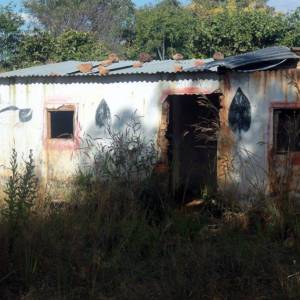 By Jaff Napoleon Bamenjo | Coordinator Joining Hands Cameroon, RELUFA In 2004, residents of Kishieba village in eastern Democratic Republic of Congo (DRC) were displaced from their ancestral land to make way for the Frontier Mine, a cobalt and copper mining project currently owned and operated by Eurasian Natural Resources Corporation (ENRC). The residents of… Read more »
By Jaff Napoleon Bamenjo | Coordinator Joining Hands Cameroon, RELUFA In 2004, residents of Kishieba village in eastern Democratic Republic of Congo (DRC) were displaced from their ancestral land to make way for the Frontier Mine, a cobalt and copper mining project currently owned and operated by Eurasian Natural Resources Corporation (ENRC). The residents of… Read more »
August 5, 2016
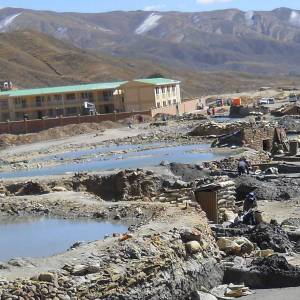 By Chenoa Stock | Mission Co-worker, Joining Hands Bolivia As we gathered around the U-shaped tables on this Bolivian winter day, bundled in coats and scarfs – the typical meeting style in Bolivia due to the lack of central heating in any buildings or houses – we were not there to debate or be heard… Read more »
By Chenoa Stock | Mission Co-worker, Joining Hands Bolivia As we gathered around the U-shaped tables on this Bolivian winter day, bundled in coats and scarfs – the typical meeting style in Bolivia due to the lack of central heating in any buildings or houses – we were not there to debate or be heard… Read more »
 New platform of communities fighting for their rights to health present their demands to Minister of Health By Jed Koball | Mission Co-Worker, Joining Hands Peru Leaders representing eight different communities whose health is affected by mining and oil industry activity gathered for the first time this past week in Lima. Dating back as much as… Read more »
New platform of communities fighting for their rights to health present their demands to Minister of Health By Jed Koball | Mission Co-Worker, Joining Hands Peru Leaders representing eight different communities whose health is affected by mining and oil industry activity gathered for the first time this past week in Lima. Dating back as much as… Read more »
 New platform of communities fighting for their rights to health present their demands to Minister of Health By Jed Koball | Mission Co-Worker, Joining Hands Peru Leaders representing eight different communities whose health is affected by mining and oil industry activity gathered for the first time this past week in Lima. Dating back as much as… Read more »
New platform of communities fighting for their rights to health present their demands to Minister of Health By Jed Koball | Mission Co-Worker, Joining Hands Peru Leaders representing eight different communities whose health is affected by mining and oil industry activity gathered for the first time this past week in Lima. Dating back as much as… Read more »
 By Jed Koball | Mission Co-worker Peru A report earlier this week from the nationally distributed paper La Republica, claims that The Renco Group, Inc. has once again filed an investment dispute arbitration against the State of Peru in the World Bank’s arbitration forum the Investment Center for the Settlement of Investment Disputes (ICSID). To…
By Jed Koball | Mission Co-worker Peru A report earlier this week from the nationally distributed paper La Republica, claims that The Renco Group, Inc. has once again filed an investment dispute arbitration against the State of Peru in the World Bank’s arbitration forum the Investment Center for the Settlement of Investment Disputes (ICSID). To…  By Chenoa Stock | Mission Co-worker, UMAVIDA, Joining Hands Bolivia The Bolivian Joining Hands Network, UMAVIDA (Joining Hands for Life), focuses their campaign for water rights and environmental justice in the city of Oruro, a principal center for mining, Bolivia’s second largest industry. Located just outside of Oruro, the small town of Huanuni is…
By Chenoa Stock | Mission Co-worker, UMAVIDA, Joining Hands Bolivia The Bolivian Joining Hands Network, UMAVIDA (Joining Hands for Life), focuses their campaign for water rights and environmental justice in the city of Oruro, a principal center for mining, Bolivia’s second largest industry. Located just outside of Oruro, the small town of Huanuni is…  By Ibond Rupas A’nzam | Coordinator of POM, Joining Hands Congo The mining sector is so far the main driver of economic growth in Democratic Republic of Congo (DRC). The mining code and mining regulations issued in 2002 and 2003 respectively attracted a large number of private investors, particularly in the Copperbelt region of Katanga…
By Ibond Rupas A’nzam | Coordinator of POM, Joining Hands Congo The mining sector is so far the main driver of economic growth in Democratic Republic of Congo (DRC). The mining code and mining regulations issued in 2002 and 2003 respectively attracted a large number of private investors, particularly in the Copperbelt region of Katanga…  By Alejandrina Ibañez Aramayo | UMAVIDA Twenty years ago, the Peñas Canyon, located in the Pazña Municipality and Department of Oruro, Bolivia, was a prosperous community that thrived from diverse, agricultural production, including potato, quinoa, fodder, broad beans, corn, a variety of tubers, etc. But now, the community solely depends on livestock subsistence farming for…
By Alejandrina Ibañez Aramayo | UMAVIDA Twenty years ago, the Peñas Canyon, located in the Pazña Municipality and Department of Oruro, Bolivia, was a prosperous community that thrived from diverse, agricultural production, including potato, quinoa, fodder, broad beans, corn, a variety of tubers, etc. But now, the community solely depends on livestock subsistence farming for…  RELUFA, the Joining Hands network in Cameroon, has just released a policy brief on the implementation of the Kimberley Process in Cameroon. The Kimberley Process is a process that is meant to keep “conflict diamonds” (diamonds procured through the financing of violence and war) out of the market. RELUFA’s policy brief “The Kimberley Process: Responding to challenges and Policy…
RELUFA, the Joining Hands network in Cameroon, has just released a policy brief on the implementation of the Kimberley Process in Cameroon. The Kimberley Process is a process that is meant to keep “conflict diamonds” (diamonds procured through the financing of violence and war) out of the market. RELUFA’s policy brief “The Kimberley Process: Responding to challenges and Policy…  By Jed Koball | Mission Co-worker Peru The recently released award-winning documentary ¨When Two Worlds Collide¨ tells the dramatic story of the 2009 massacre in Bagua, Peru that shaped the context of modern day politics and development in Peru and also helped set the course of advocacy for our Joining Hands partners there. 2009 was…
By Jed Koball | Mission Co-worker Peru The recently released award-winning documentary ¨When Two Worlds Collide¨ tells the dramatic story of the 2009 massacre in Bagua, Peru that shaped the context of modern day politics and development in Peru and also helped set the course of advocacy for our Joining Hands partners there. 2009 was…  By Jaff Napoleon Bamenjo | Coordinator Joining Hands Cameroon, RELUFA In 2004, residents of Kishieba village in eastern Democratic Republic of Congo (DRC) were displaced from their ancestral land to make way for the Frontier Mine, a cobalt and copper mining project currently owned and operated by Eurasian Natural Resources Corporation (ENRC). The residents of…
By Jaff Napoleon Bamenjo | Coordinator Joining Hands Cameroon, RELUFA In 2004, residents of Kishieba village in eastern Democratic Republic of Congo (DRC) were displaced from their ancestral land to make way for the Frontier Mine, a cobalt and copper mining project currently owned and operated by Eurasian Natural Resources Corporation (ENRC). The residents of…  By Chenoa Stock | Mission Co-worker, Joining Hands Bolivia As we gathered around the U-shaped tables on this Bolivian winter day, bundled in coats and scarfs – the typical meeting style in Bolivia due to the lack of central heating in any buildings or houses – we were not there to debate or be heard…
By Chenoa Stock | Mission Co-worker, Joining Hands Bolivia As we gathered around the U-shaped tables on this Bolivian winter day, bundled in coats and scarfs – the typical meeting style in Bolivia due to the lack of central heating in any buildings or houses – we were not there to debate or be heard…